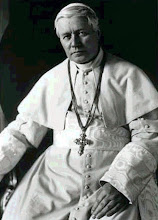Christ's Mission is Universal
With those words, from the Gospel of St. John (12:32), Our Lord Jesus Christ outlined his whole programme for the history of humanity. He drew to its fruition the Theology of History as proclaimed by Abraham and the Prophets, and - with the Holy Spirit operating through St. John the Baptist - fulfilled the Will of His Father by revealing His Sacred and Divine Identity and Mission to His people, the Jewish nation.
However, now, the call was universal - to all men. For example, the Roman centurion prayer to Christ for mercy on his ill servant ("Domine, non sum dignus"...[Lord, I am not worthy to receive you...]). This universality of Salvation - more urgent than ever in a world converging on a world culture - must be therefore preached with clarity to all men without exception - to Jew and Gentile alike. Such preaching must be bound with love, but true love supposes truth. The Church temporal, being in possession of the absolute truth in faith and morals is bound before Her Lord and Master, Christ, to preach to all men (c.f. Satis cognitum, Quas Primas).
"Christ loved the Church, and delivered Himself up for it" (Eph. v., 25)
Pope Leo XIII, opening his encyclical, Satis Cognitum (On the Unity of the Church) draws our attention to Christ's redemptive power that operates through and for the Church. Men are redeemed by being part of the Church. Thus, all men are called to the one arc of Salvation. Thus, to believe in Christ is to believe in the Church, to believe in the Church is to believe in Christ. Pope Leo writes: "But the mission of Christ is to save that which had perished: that is to say, not some nations or peoples, but the whole human race, without distinction of time or place. "The Son of Man came that the world might be saved by Him" (John iii., 17)". Thus man is saved by Christ, through the Church.
Historically, the evangelizing mission was attacked and undermined by the corruptive influence of the western schism, corrupt prelates, meddling princes and generally low level of morals amongst the clergy. This was then accelerated by the paganizing Renaissance, to be then followed by the so-called Reformation. Following that, false principles of jurisprudence (as exemplified by such diverse characters as Hobbes, Locke and Rousseau) were promoted within government, as well as with subjective concepts of dynamic "truth" becoming the basis of philosophy. Following, there would be various offshoots and various reactions. Pope Leo XIII encouraged the blossoming Thomist movement to propose to humanity once again the ability to conduct true rational thought, through a true metaphysics of being.
The Corruption of Truth
The modernist philosopher develops and follows the agnostic Kantian-Hegelian path - one of subjectivism, and truth being a never ending product of the dynamic mind. The logical extension of Kant was that religion is a product of the mind, the mind as found within a given moment in history, within a given culture. Truth is not absolute, it is not outside of the mind to be conformed to by the reasoning person. Rather, it is something personal and moulded in the mind. Religion, faith, religious experience is "true" for the "believer", but can be false for the next "believer". All is immanent in the mind of the person. Granted, Kant did concede the existence of reality outside the mind, but that it was subjectified when processed. He therefore sought to create a counterbalance between philosophy of conformity to the object, with conformity to the subject. What Kant the Lutheran did, however, was create an agnostic atmosphere regarding metaphysics and the divine by denying the possibility of using reason to reach God.
As Pius X identified, once religion is no longer objective reality, but subjective thought, all religions become equally true (and hence, equally false). The ax is then set to the root of the Tree of Life, Catholicism is uprooted, and religious "insanity" (c.f. Mirari Vos, Gregory XVI) abounds. We can see this in the more extreme forms of contemporary gnosticism, and the explosion of external elements (though perverted) of eastern philosophy and religion in formerly Christian countries, such as various forms of psychosomatic "meditation". One wonders what the Bhuddist or Hindu really thinks of the pick and choose approach of the typical lasped western Christian.
In conclusion, one of the many lessons of Pascendi is the unattainability of truth for the modernist, his/her * rejection of the mind conforming to the object, the reduction of religious experience from an objective experience with the True God to a subjective experience. Religion is reduced to an external ritual, derived from dynamic and perpetually evolving historical circumstances that has its foundations in agnosticism.
* "His/her" is added, not out of any concession to neo-Marxist political correctness, nor to contemporary academic writing styles, but to the reality that as many women as men succumb to subjectivist modernism.
Friday, February 23, 2007
Subscribe to:
Comments (Atom)
